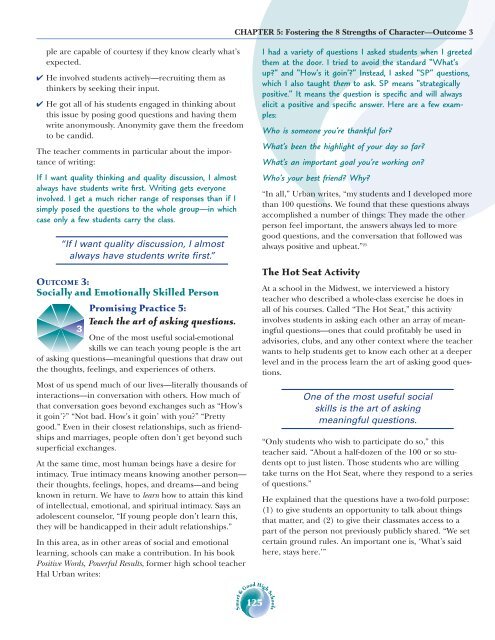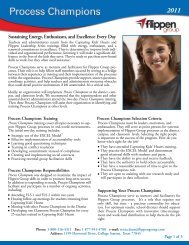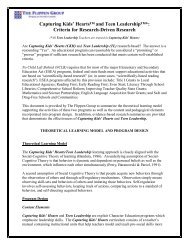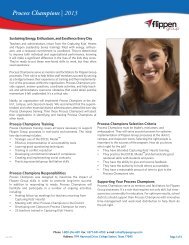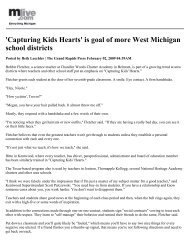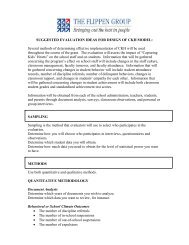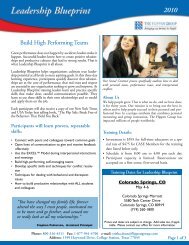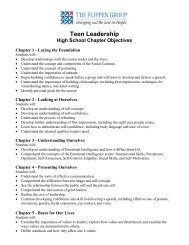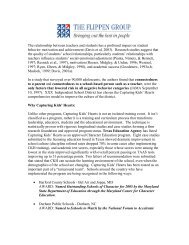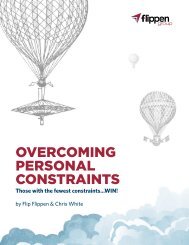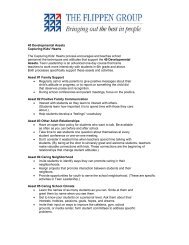Smart & Good High Schools - The Flippen Group
Smart & Good High Schools - The Flippen Group
Smart & Good High Schools - The Flippen Group
- No tags were found...
You also want an ePaper? Increase the reach of your titles
YUMPU automatically turns print PDFs into web optimized ePapers that Google loves.
CHAPTER 5: Fostering the 8 Strengths of Character—Outcome 3ple are capable of courtesy if they know clearly what’sexpected.✔ He involved students actively—recruiting them asthinkers by seeking their input.✔ He got all of his students engaged in thinking aboutthis issue by posing good questions and having themwrite anonymously. Anonymity gave them the freedomto be candid.<strong>The</strong> teacher comments in particular about the importanceof writing:If I want quality thinking and quality discussion, I almostalways have students write first. Writing gets everyoneinvolved. I get a much richer range of responses than if Isimply posed the questions to the whole group—in whichcase only a few students carry the class.“If I want quality discussion, I almostalways have students write first.”OUTCOME 3:Socially and Emotionally Skilled PersonPromising Practice 5:Teach the art of asking questions.3One of the most useful social-emotionalskills we can teach young people is the artof asking questions—meaningful questions that draw outthe thoughts, feelings, and experiences of others.Most of us spend much of our lives—literally thousands ofinteractions—in conversation with others. How much ofthat conversation goes beyond exchanges such as “How’sit goin’?” “Not bad. How’s it goin’ with you?” “Prettygood.” Even in their closest relationships, such as friendshipsand marriages, people often don’t get beyond suchsuperficial exchanges.At the same time, most human beings have a desire forintimacy. True intimacy means knowing another person—their thoughts, feelings, hopes, and dreams—and beingknown in return. We have to learn how to attain this kindof intellectual, emotional, and spiritual intimacy. Says anadolescent counselor, “If young people don’t learn this,they will be handicapped in their adult relationships.”In this area, as in other areas of social and emotionallearning, schools can make a contribution. In his bookPositive Words, Powerful Results, former high school teacherHal Urban writes:I had a variety of questions I asked students when I greetedthem at the door. I tried to avoid the standard “What’sup?” and “How’s it goin’?” Instead, I asked “SP” questions,which I also taught them to ask. SP means “strategicallypositive.” It means the question is specific and will alwayselicit a positive and specific answer. Here are a few examples:Who is someone you’re thankful for?What’s been the highlight of your day so far?What’s an important goal you’re working on?Who’s your best friend? Why?“In all,” Urban writes, “my students and I developed morethan 100 questions. We found that these questions alwaysaccomplished a number of things: <strong>The</strong>y made the otherperson feel important, the answers always led to moregood questions, and the conversation that followed wasalways positive and upbeat.” 25<strong>The</strong> Hot Seat ActivityAt a school in the Midwest, we interviewed a historyteacher who described a whole-class exercise he does inall of his courses. Called “<strong>The</strong> Hot Seat,” this activityinvolves students in asking each other an array of meaningfulquestions—ones that could profitably be used inadvisories, clubs, and any other context where the teacherwants to help students get to know each other at a deeperlevel and in the process learn the art of asking good questions.One of the most useful socialskills is the art of askingmeaningful questions.“Only students who wish to participate do so,” thisteacher said. “About a half-dozen of the 100 or so studentsopt to just listen. Those students who are willingtake turns on the Hot Seat, where they respond to a seriesof questions.”He explained that the questions have a two-fold purpose:(1) to give students an opportunity to talk about thingsthat matter, and (2) to give their classmates access to apart of the person not previously publicly shared. “We setcertain ground rules. An important one is, ‘What’s saidhere, stays here.’”125<strong>Smart</strong> & <strong>Good</strong> <strong>High</strong> <strong>Schools</strong>


